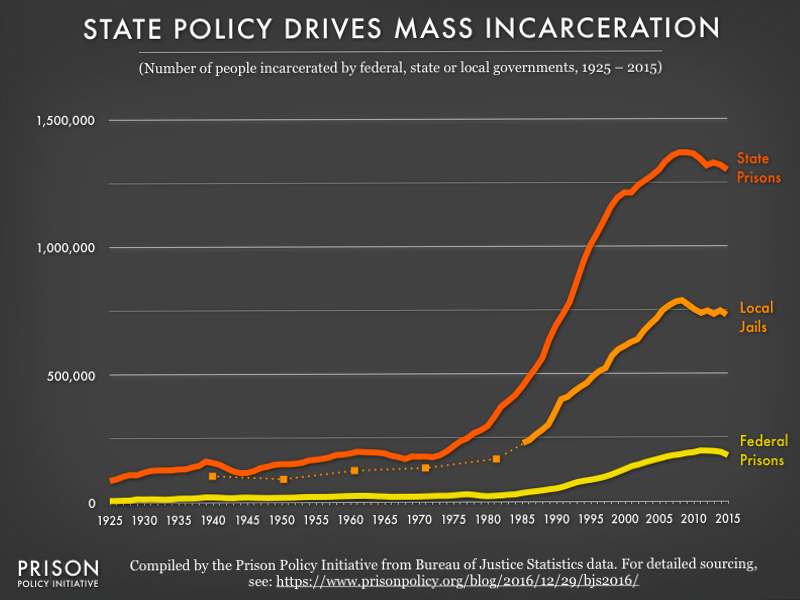President Obama’s parting reminders on criminal justice reform
President Obama's article speaks to some of the most important lessons we've learned in our work to end mass incarceration.
by Bernadette Rabuy, January 10, 2017
Last week, President Obama surprised criminal justice reformers with an article in the Harvard Law Review on The President’s Role in Advancing Criminal Justice Reform. While the President spends more of the article summarizing his efforts to reform the criminal justice system than sharing an analysis of the challenges he faced trying to make our criminal justice system more just, President Obama’s article speaks to some of the most important lessons we’ve learned in our work to end mass incarceration. We believe that understanding the following points is key to meaningful justice reform:
- State and local policies drive mass incarceration. Citing our report, Mass Incarceration: The Whole Pie, Obama explains that, “State and local officials are responsible for most policing issues, and they are in charge of facilities that hold more than 90% of the prison population and the entire jail population.” President Obama’s reminder should spark hope among advocates. While criminal justice reform is likely to be more challenging at the federal level during the Trump administration, Americans should not forget how impactful state and local reforms can be in reducing the incarcerated population.
- Mass incarceration is bad for all Americans. President Obama reminds readers that “It would be a tragic mistake to treat criminal justice reform as an agenda limited to certain communities. All Americans have an interest in living in safe and vibrant neighborhoods…” The sheer scale of our criminal justice system means both that mass incarceration has harmed the lives of many Americans and that government resources that could be used for other social services are instead spent on locking people up. For these reasons, even Americans who have never come into contact with the criminal justice system or don’t have a loved one behind bars have an interest in the country reducing its unprecedented use of incarceration.
- The true reach of our criminal justice system goes beyond those behind bars. President Obama cites our blog to explain that beyond the incarcerated, there are the many Americans with criminal records, the people released from prisons each year, and the 11 million people who cycle through local jails. In our view, keeping the true scope of the system in mind will make it that much easier for advocates to steer clear of reforms that simply transfer people from one piece of the correctional control pie to another and think more expansively about what reducing incarceration rates means for correctional supervision like probation and parole.
President Obama’s article is further evidence of how far our country has moved away from the tough on crime narrative that used to be overwhelmingly popular with Democrats and Republicans alike. At this time when hateful rhetoric is becoming more normalized, we hope that more people can take a cue from Obama who speaks about those who have committed crimes as people who have made mistakes.
For more reactions to President Obama’s article, we recommend:
- Jonathan Blanks, Obama praises himself on criminal justice reform but he could have done so much more, Rare
This article points out that Obama fails to mention in his law review article how the federal government has responded to states’ growing liberalization of state marijuana laws and explains why that omission may have been intentional. - Radley Balko, When Obama wouldn’t fight for science, The Washington Post
Radley Balko explains how the Department of Justice denounced a report by the President’s Council of Advisors on Science and Technology about forensic science and what the ramifications of the Department of Justice’s refusal to assess forensics might be. - Mark Joseph Stern, The George W. Bush Advice Obama Should Have Taken, Slate
Slate published a new interview with Margaret Colgate Love, who served as United States pardon attorney from 1990 to 1997. Love explains that Obama could have had a more meaningful clemency legacy if he had used his pardon power more or created a clemency commission like President Ford.




